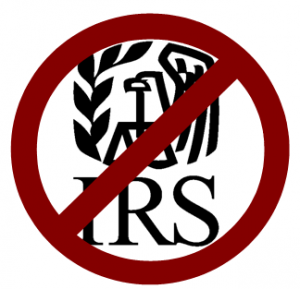TAKE ACTION: Click here to stop the IRS assault of the Tea Party

Many groups like Americans for Limited Government (ALG) have been urging members of Congress to refuse to pass the debt ceiling unless there is an explicit prohibition against the Internal Revenue Service from issuing a new regulation severely restricting political activity of 501(c)(4) organizations.
In short, the debt ceiling is the only leverage Congress will have — there are no more continuing resolutions until the end of Fiscal Year 2015 — to address this issue.
It’s the debt ceiling, or it’s accepting the speech police and IRS implementation of restrictions that will last likely through the duration of the 2016 election cycle. Congress can use its power of the purse, or other than its periodic oversight hearings, it will cease to be a truly effective voice on this issue.
Yet, House leaders so far refuse to act.
Affected groups would be forced to fight for their very survival in court. For, the new IRS regulation is not just an existential threat to tea party and other conservative groups, but every single 501(c)(4), of which there are tens of thousands, and free speech itself.
You see, not content with merely targeting tea party and other 501(c)(4) organizations that engage in various types of political activity on an ad-hoc basis, the Obama administration via the Treasury Department has come up with a far more uniform approach to stifling (c)(4) political speech.
Under existing rules, an organization may carry on electioneering activities so long as it does not constitute a majority of its activities. But, no longer.
Now, limitations will be imposed not simply on advocacy for or against a candidate for public office, as has been the case for over 50 years, but on any communication that even mentions a public official who happens to be a candidate. Specifically, the regulations will define “certain communications that are close in time to an election and that refer to a clearly identified candidate as electioneering communications.”
It applies blackout periods 60 days prior to the general election and 30 days prior to primary elections at the federal, state, and local level.
When even the American Civil Liberties Union (ACLU) and ALG agree on an issue, you know there’s something wrong.
Here was the ACLU’s comment to the Department of Treasury on the regulation: “It’s crucial to note that the ACLU’s website includes literally hundreds of thousands of individual webpages, and the proposed blackout rules would cover vast amounts of content that has absolutely nothing to do even with issue advocacy, let alone partisan politicking. For instance, it could cover copies of publicly filed lawsuits with government defendants, requests under the Freedom of Information Act, any communication addressed to a candidate currently holding elective or appointed office or even 50-state legal surveys mentioning covered officials.”
The ACLU comment continued, “To put a finer and final point on it, we note that these comments, when posted to the ACLU’s website and otherwise distributed, would likely qualify as [candidate-related political activity] under the proposed rule during the 60/30-day blackout period, including the rolling blackout period before the 2014 election. The ACLU would have to either remove this document from its website or otherwise determine a way to account for the expense in creating it as [candidate-related political activity] expenditures.”
Why, that’s exactly what we were saying just as soon as the regulation was proposed. On December 2, I wrote, “To give readers an idea of the broad implication of this regulation, Americans for Limited Government is a 501(c)(4) organization whose websites have content dating back to 2008. Understandably under prior rules allowing it we have written extensively about public officials, including members of Congress, who also happen to be candidates that run for office every two years.
“Thousands of articles, in fact — nearly all of them mention public officials (who are usually running for reelection) or reference legislation or policies they support. These are not electioneering communications. They do not advocate for or against the election of candidates — a constitutionally protected activity, but let’s leave that aside for a moment — they supported or criticized policies being proposed in the public arena.
“But because the articles mention officials who happen to be candidates, and because primary elections occur at various intervals throughout election years, and because it is impossible to decipher by what standard the agency will determine to what degree actions are “candidate-related political activity,” complying with the new regulation might make it impossible for Americans for Limited Government to continue in its current form.
“It is possible we would have to either shut down our website or go article by article to remove ones that mentioned public officials who happen to be running for reelection.”
In short, this regulation is going to require every single 501(c)(4) to basically shut down any discussion of elected officials during the campaign blackout windows, even if that speech took place years ago. If Congress is unwilling to fight now using its power of the purse, there won’t be any outside groups on the conservative side or any side able to do anything come election time. It will just be PACs and party committees.
The Supreme Court just lifted these types of restrictions in the 2010 Citizens United decision and now here we are about to go back into the dark ages, with the nuance that these regulations will be far more restrictive than McCain-Feingold ever was.
It is up to Congress to stop this persecution, which the Supreme Court has already struck down as a blatant First Amendment violation. Members of both houses of Congress should refuse to increase the debt ceiling until an explicit prohibition is placed on the IRS from issuing such speech restrictions. Members cannot afford to wait for the courts to act, a process that can take years and may not occur until after the 2016 elections.
If members refuse to act, then perhaps it is time to question why we have a Congress at all that will not use its power of the purse to insist Obamacare be defunded. That will not defund the Environmental Protection Agency that is arbitrarily implementing carbon emissions restrictions without any vote in Congress. And that will not stop the IRS from implementing DISCLOSE Act-style restrictions without any change of law.
Come to think of it, even when the government was supposedly shut down last October, more than 86 percent, or $3.15 trillion of “automatic” spending continued without any additional congressional authorization. Is this representative government?
Congress has the power of the purse and can make effective use of it should they choose to do so. The only way all of this stops is if Congress refuses to increase the debt ceiling. For proof that this can be an effective tool at achieving concessions from the Obama administration, there wouldn’t have been sequestration without the debt ceiling debate in 2011.
But if the fear is that by fighting Obama on the debt ceiling, House Republicans believe they will lose, if that is the argument, and in the process the American people continue to lose battle after battle, it appears surrender has become a self-fulfilling proposition.
Why should we even have a Congress or the constitutional separation of powers at all if all real legislative powers have already, willingly been ceded to the executive branch? Serious question.
Robert Romano is the senior editor of Americans for Limited Government.
TAKE ACTION: Click here to stop the IRS assault of the Tea Party







